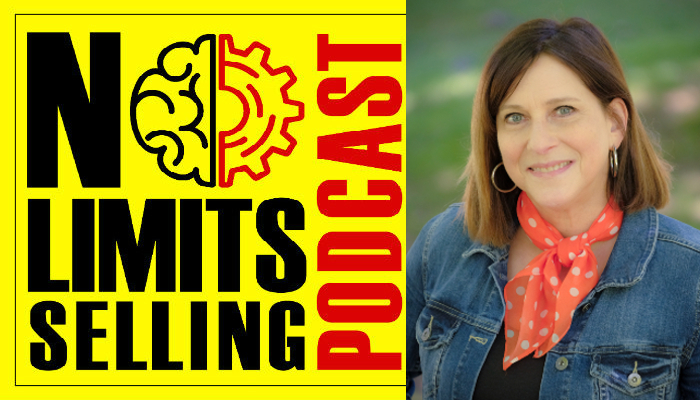3 Sales Secrets That Will Ignite Your Sales
On Episode 244 of The No Limits Selling Podcast, we have Kay Miller, an expert on Uncopyable Sales. As the first woman ever hired for outside sales by Emerick, a division of Anchor Hocking, she built her formidable sales career by emphasizing long-term relationships over one-time deals. In this episode, Kay shares with us sales secrets that will ignite your sales.
Kay was later hired by Walker Exhaust, a division of Tenneco, and the largest automotive muffler manufacturer in the world. While there, she was named Walker’s Salesperson of the Year, an accolade that earned her the nickname “Muffler Mama.”
Kay has been a top sales performer ever since, and now speaks and consults. She’s the author of the new book, Uncopyable Sales Secrets – How to Create an Unfair Advantage and Outsell Your Competition. The book has been called “The most fun sales book you’ve ever read,” and is packed with powerful strategies as well as specific actions you can start using immediately to make more sales.
Kay lives outside Seattle with her husband, Steve, and cat, Sam. Her favorite activities include skiing, hiking, and spending time with their adult daughter, Kelly.

Contact Kay:
[EDITOR’S NOTE: This podcast is sponsored by No Limits Selling. It is a fun, fast-paced podcast that delivers hard-fought business advice that you can implement today to improve your sales and performance]
Interested In Our Real Estate Coaching Services? Explore Our Website: Link
Feeling Not Well Today? You Can Use Our Mindset Boosters App To amp Up Your Mood: Link
Find us on Social Media:
LinkedIn | Facebook community | Instagram
Like what do you listen to? Subscribe to our podcast!
Ready to become fearless? We can help you become fearless in 60 days so you accomplish more in your career Schedule A 15 min Call with Umar
Summary
Introduction and Background of the Guests
The No Limits Selling Podcast, hosted by Umar Hameed, is a platform where leaders come to grow. In this episode, Hameed invites Kay Miller, a seasoned business coach, to share her insights, experiences, and sales secrets. Hameed, known for his expertise in changing individual and team behaviors, uses tools from Applied Neuroscience and NLP to help individuals and organizations achieve success. Miller, on the other hand, is a passionate coach who aids entrepreneurs and business owners in growing their businesses and realizing their goals. She firmly believes in the power of the right mindset and tools in achieving success.
Kay Miller's Entrepreneurial Journey
In the podcast, Miller opens up about her journey from being an employee in the corporate world to becoming a successful entrepreneur. She started her career working for a large multinational company, but her desire to make a significant difference in people's lives led her to start her business coaching practice. Despite the challenges and risks associated with leaving a stable job and starting a new venture, Miller describes the decision as one of the most rewarding of her life.
The Role and Impact of a Business Coach
Miller further elaborates on her role as a business coach. She works closely with entrepreneurs and business owners, providing them with the necessary tools and strategies to grow their businesses and achieve their goals. She emphasizes the importance of mindset in achieving success, stating that it is as crucial as having the right strategy. Her coaching approach is a blend of strategic planning and mindset development, which she believes is the key to sales success in business.
A Success Story: Turning Challenges into Opportunities
To illustrate the impact of her coaching, Miller shares a success story of a client who was struggling to grow her business. The client had a great product but was having trouble reaching her target market. Miller worked with her to develop a marketing strategy that resonated with her audience. They analyzed the market, identified the client's unique selling proposition, and crafted a marketing message that spoke directly to the needs and desires of her target customers. As a result of this strategic approach and one of her sales secrets, the client was able to double her sales in just six months, a testament to the power of effective coaching.
Conclusion: The Power of Sharing Knowledge
The podcast concludes with a note of gratitude. Hameed thanks Miller for her time and for sharing her valuable insights, experiences, and sales secrets. Miller, in turn, expresses her appreciation for the opportunity to share her knowledge and experiences. This episode of the No Limits Selling Podcast serves as a powerful reminder of the impact of the right mindset, strategic planning, and effective coaching in achieving business success.
Faq
Who is Kay Miller?
What was Kay Miller's journey from the corporate world to entrepreneurship?
What is the role of a business coach according to Kay Miller?
Can you share a success story from Kay Miller's coaching practice?
What are the key takeaways from this episode of the No Limits Selling Podcast?
Don’t miss this opportunity to transform your real estate career with one-on-one coaching. As an experienced real estate coach, I, Umar Hameed, am dedicated to helping you unlock your full potential and achieve your real estate goals. To learn more about who am I and my clients ↓
If you’re ready to take the next step, book an appointment with me today and begin your journey toward success in the real estate industry.
